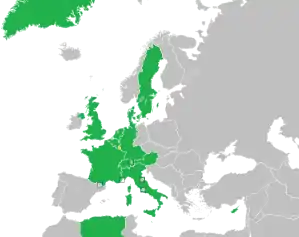Eurovision Song Contest 1959
The Eurovision Song Contest 1959 was the fourth edition of the annual Eurovision Song Contest. It took place in the French seaside city of Cannes, following France's victory at the 1958 contest with the song "Dors, mon amour" by André Claveau. Organised by the European Broadcasting Union (EBU) and host broadcaster Radiodiffusion-Télévision Française (RTF), the contest was held at Palais des Festivals et des Congrès on Wednesday 11 March 1959, and was hosted by French television presenter Jacqueline Joubert.[1]
| Eurovision Song Contest 1959 | |
|---|---|
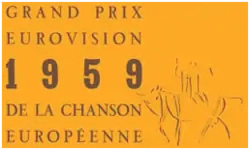 | |
| Dates | |
| Final | 11 March 1959 |
| Host | |
| Venue | Palais des Festivals et des Congrès Cannes, France |
| Presenter(s) | Jacqueline Joubert |
| Musical director | Franck Pourcel |
| Directed by | Marcel Cravenne |
| Host broadcaster | Radiodiffusion-Télévision Française (RTF) |
| Interval act | Franck Pourcel's Orchestra |
| Website | eurovision |
| Participants | |
| Number of entries | 11 |
| Debuting countries | |
| Returning countries | |
| Non-returning countries | |
Participation map
| |
| Vote | |
| Voting system | Ten-member juries distributed 10 points among their favourite songs. |
| Nul points in final | None |
| Winning song | "Een beetje" |
Eleven countries participated in the contest this year. Monaco made its debut in the contest, the United Kingdom returned after being absent the previous year, and Luxembourg decided not to participate.
The winner was the Netherlands with the song "Een beetje", performed by Teddy Scholten, written by Willy van Hemert and composed by Dick Schallies. This was already the Netherlands' second victory in the contest, having also won in 1957 - at the same time marking the first time a country had won more than once. Willy van Hemert had also written the first Dutch winner in 1957.
Location
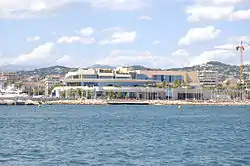
The event took place in Cannes, France, with the venue being the original building of Palais des Festivals et des Congrès, after France got the right to host this edition of the Eurovision Song Contest for winning the 1958 edition with the song "Dors, mon amour" performed by André Claveau. Cannes, a city located on the French Riviera, is a busy tourist destination and known worldwide for hosting the annual Cannes Film Festival, with the Palais des Festivals et des Congrès also hosting the Film Festival. The original building was built in 1949 and was located on the boulevard of Promenade de la Croisette, on the present site of the JW Marriott Cannes.
Format
A new rule was created for this edition, ensuring that no professional publishers or composers were allowed in the national juries. During the voting, Italy gave one point to France, no points to the UK and seven points to the Netherlands placing them just three points ahead of the UK. Later on, France gave only three points to Italy and four points to the Netherlands thus giving them a five-point lead over the UK, who were only one point ahead of France, leaving Italy behind in sixth position, behind Denmark, on nine points. The third- and second-placed songs, France and United Kingdom respectively, were also allowed to sing again at the end of the show along with the winner the Netherlands, something that occurred only this year and was never subsequently repeated again.
Participating countries
Luxembourg decided not to return to the competition, having competed every year until then. The United Kingdom returned after missing the previous contest (appearing on the scoreboard as "Grande Bretagne") and finished second for the first time. The UK would go on to have 15 second-place finishes in the country's history in the contest. The small principality of Monaco competed for the first time in this year's contest, but unfortunately came last.[2]
Conductors
Each performance had a conductor who directed the orchestra.[3][4]
 France – Franck Pourcel
France – Franck Pourcel Denmark – Kai Mortensen
Denmark – Kai Mortensen Italy – William Galassini
Italy – William Galassini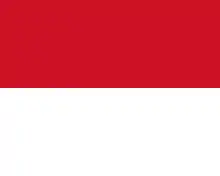 Monaco – Franck Pourcel
Monaco – Franck Pourcel Netherlands – Dolf van der Linden
Netherlands – Dolf van der Linden Germany – Franck Pourcel
Germany – Franck Pourcel Sweden – Franck Pourcel
Sweden – Franck Pourcel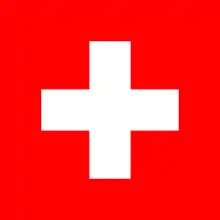 Switzerland – Franck Pourcel
Switzerland – Franck Pourcel Austria – Franck Pourcel
Austria – Franck Pourcel United Kingdom – Eric Robinson
United Kingdom – Eric Robinson.svg.png.webp) Belgium – Francis Bay
Belgium – Francis Bay
Returning artists
| Artist | Country | Previous year(s) |
|---|---|---|
| Birthe Wilke | 1957 (alongside Gustav Winckler) | |
| Domenico Modugno | 1958 |
Results
| Draw | Country | Artist | Song | Language[5][6] | Place[7] | Points |
|---|---|---|---|---|---|---|
| 01 | Jean Philippe | "Oui, oui, oui, oui" | French | 3 | 15 | |
| 02 | Birthe Wilke | "Uh, jeg ville ønske jeg var dig" | Danish | 5 | 12 | |
| 03 | Domenico Modugno | "Piove (Ciao, ciao bambina)" | Italian | 6 | 9 | |
| 04 | Jacques Pills | "Mon ami Pierrot" | French | 11 | 1 | |
| 05 | Teddy Scholten | "Een beetje" | Dutch | 1 | 21 | |
| 06 | Alice and Ellen Kessler | "Heute Abend wollen wir tanzen geh'n" | German | 8 | 5 | |
| 07 | Brita Borg | "Augustin" | Swedish | 9 | 4 | |
| 08 | Christa Williams | "Irgendwoher" | German | 4 | 14 | |
| 09 | Ferry Graf | "Der K und K Kalypso aus Wien" | German | 9 | 4 | |
| 10 | Pearl Carr and Teddy Johnson | "Sing, Little Birdie" | English | 2 | 16 | |
| 11 | Bob Benny | "Hou toch van mij" | Dutch | 6 | 9 |
Scoreboard
| France | 15 | 2 | 1 | 1 | 4 | 2 | 1 | 4 | ||||
|---|---|---|---|---|---|---|---|---|---|---|---|---|
| Denmark | 12 | 2 | 2 | 1 | 4 | 1 | 1 | 1 | ||||
| Italy | 9 | 1 | 3 | 1 | 1 | 3 | ||||||
| Monaco | 1 | 1 | ||||||||||
| Netherlands | 21 | 3 | 1 | 3 | 2 | 1 | 7 | 4 | ||||
| Germany | 5 | 1 | 1 | 1 | 2 | |||||||
| Sweden | 4 | 3 | 1 | |||||||||
| Switzerland | 14 | 1 | 5 | 1 | 3 | 1 | 1 | 2 | ||||
| Austria | 4 | 1 | 2 | 1 | ||||||||
| United Kingdom | 16 | 2 | 2 | 3 | 5 | 2 | 1 | 1 | ||||
| Belgium | 9 | 2 | 3 | 1 | 1 | 2 | ||||||
Spokespersons
.svg.png.webp) Belgium – Bert Leysen
Belgium – Bert Leysen United Kingdom – Pete Murray
United Kingdom – Pete Murray Austria – Karl Bruck
Austria – Karl Bruck Switzerland – Boris Acquadro
Switzerland – Boris Acquadro Sweden – Roland Eiworth
Sweden – Roland Eiworth Germany – Hans-Joachim Rauschenbach
Germany – Hans-Joachim Rauschenbach Netherlands – Siebe van der Zee[10]
Netherlands – Siebe van der Zee[10] Monaco – TBC
Monaco – TBC Italy – Enzo Tortora
Italy – Enzo Tortora Denmark – Svend Pedersen
Denmark – Svend Pedersen France – Marianne Lecène
France – Marianne Lecène
Broadcasts
Each national broadcaster also sent a commentator to the contest, in order to provide coverage of the contest in their own native language.
| Country | Broadcaster(s) | Commentator(s) | Ref(s) |
|---|---|---|---|
| ORF | Elena Gerhard | ||
| INR | French: Paule Herreman | ||
| NIR | Dutch: Nic Bal | ||
| Danmarks Radio TV | Sejr Volmer-Sørensen | ||
| RTF | Claude Darget | ||
| Deutsches Fernsehen | Elena Gerhard | ||
| Programma Nazionale | Renato Tagliani | ||
| Télé Monte Carlo | Claude Darget | ||
| NTS | Piet te Nuyl | ||
| Sveriges TV, SR P1 | Jan Gabrielsson | ||
| TV DRS | German: Theodor Haller | ||
| TSR | French: Claude Darget | ||
| BBC Television Service | Tom Sloan | [4] | |
| BBC Light Programme | Pete Murray |
| Country | Broadcaster(s) | Commentator(s) | Ref(s) |
|---|---|---|---|
| Télé-Luxembourg | Claude Darget |
References
- "Eurovision History – Cannes 1959". European Broadcasting Union. Retrieved 5 March 2012.
- "Cannes 1959". Eurovision.tv.
- "And the conductor is..." Retrieved 10 July 2018.
- Roxburgh, Gordon (2012). Songs for Europe: The United Kingdom at the Eurovision Song Contest. Volume One: The 1950s and 1960s. Prestatyn: Telos Publishing. pp. 184–192. ISBN 978-1-84583-065-6.
- "Eurovision Song Contest 1959". The Diggiloo Thrush. Retrieved 4 March 2012.
- "Eurovision Song Contest 1959". 4Lyrics.eu. Retrieved 16 September 2020.
- "Final of Cannes 1959". European Broadcasting Union. Archived from the original on 27 March 2021. Retrieved 27 March 2021.
- "Results of the Final of Cannes 1959". European Broadcasting Union. Archived from the original on 27 March 2021. Retrieved 27 March 2021.
- "Eurovision Song Contest 1959 – Scoreboard". European Broadcasting Union. Archived from the original on 29 June 2015. Retrieved 14 June 2021.
- "Succes van Teddy Scholten in Cannes met „Een beetje"". Nieuwe Leidsche Courant. 12 March 1959. pp. 1, 5. Retrieved 11 June 2021.
External links
| Wikimedia Commons has media related to Eurovision Song Contest 1959. |
